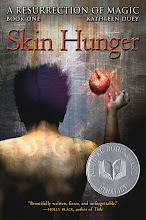. little bitty essays about writing
Tuesday, March 27, 2012
Self-publishing. It has all been said elsewhere, I would just like to add my two cents and a slightly different perspective. I write for kids and teens, publish traditionally, and speak and teach writing at writers' conferences. I have had many experiences with self published authors, most of whom give me signed copies of their work and ask me for blurbs or comments on Amazon if I enjoy the read.
I say this quietly and respectfully,aware of the effort they expended writing and marketing their work: I have yet to write a comment or a blurb for a self-published novel.
I think the problems with self publishing are the obvious ones, and this: It’s really, really hard to get published traditionally. Agents serve as the gatekeepers between the publishers and all the would-be writers because publishers no longer have staff, time, or desire to read through their slush piles. So writers now begin searching for an agent first, as they must, because most publishers will not consider work from individuals without one. Agents are swamped, buried, slogging through submissions and they often take months, sometimes a year or more to respond to a query, even with printed rejection slips. The frustration for writers--especially those who don’t live in or near NYC, and who don’t know someone who knows someone--is terrible.
I just googled “self publish” and came up with 49,800,000 hits. The sites have phrases like, “Set your OWN royalties” and “Eliminate middlemen”. One promises to end “unneeded and endless re-writing”. Another says, “Have your books in a week and start selling!!” Lots of exclamation points. All very seductive if one is driven to write, to be read, and frustrated to the screaming point.
Conventional publishing is an antique industry and is in MAJOR flux. The returns system is a whole separate topic and a complex one. Amazon is rumored to be thinking about building brick and mortar stores. People are writing their own work, then marketing it....everywhere they can. New opportunities abound.
Most traditionally published authors I know are not in any way old fashioned nor blind. They are experimenting with formats, structures and sales channels. I am certainly not pretending to know what the future of books will be or saying that the system as it stands serves writers or readers as well as it might.
I am just saying this: It takes years of writing with purpose and intent and energy and feedback from people who don’t love you and who understand writing, to get good at writing. Prioritizing publication and marketing, assuming either one is a validation of the work in and of itself, can be discouraging, even heartbreaking for the writer. So take your time.
I have written about this here, too: http://kathleenduey.blogspot.com/2011/12/publishing-old-new-self-indie.html
San Louis Obispo Conference
 |
| pic taken by Roxyanne Young, friend and author |
I spent a day in San Louis Obispo, teaching serious writers that there are no freakin rules. They were kind enough to let me pace the floor, sit on the table, and listen to them read aloud with my eyes closed. I love writers. They notice everything. They are awake..they keep me awake.
On the train up and back (14 glorious hours of train) I reread the first 70 chapters of book #3. The story is telling itself, or so it seemed to me. And now....onward.
PS. One writer got in touch to thank me for being the only writer she had ever heard say there were no rules who then did NOT provide a sequence of rules to follow. I should probably add that there were no beginners in the room. But even if there had been, I am convinced that craft often overwhelms art and our books are not what they could be because of that.
*a few days later:: I am NOT saying art will bloom if craft is not learned. I am saying that once craft is strong and solid--which can be a long learning curve for many of us--art should probably run the show whenever possible.
Tuesday, March 13, 2012
your agent search/ my ability to help
The book covers here are unrelated to the topic. I just love them so I included them!
Finding an agent:
I don't give my agent's name to people I don't know really well--and even
then, I rarely do it. The agent/writer match up is an odd thing. Find the right
agent first time around if you can. Interview them honestly and represent
yourself honestly, too.... you are considering making them your business
partner. Make sure they LOVE your work, your career vision. It's good if
they like you a lot, too, and you like them. You want someone to be a partner
you can ask any question and get a real answer. You sign a contract, after all,
so begin this phase of your career seriously, don't rush it.
I am assuming that you are a good enough writer to begin the agent hunt. I
can't tell you how many people think they are...and aren't. If a bunch of agents
don't respond at all or several send your work back saying you aren't ready,
believe them, examine what they said and get to work. You can find places and
ways to learn how to write better in almost every town. Rejections are a
precious and free gift that agents hand to any aspiring writer: the unglossed
opinion.
 Agents don't usually want new clients who echo what they are already
repping--at least not enough of an echo to make them feel redundant to
editors/readers/publicity people. All genres contain similarities...but you
wouldn't want to compare your work to mine (or anyone else's) in a sub letter.
If you describe your work well, the agent will be able to respond accurately
according to their current needs and what they see coming down the road....etc.
Some agencies have guidelines for sub letters...if they do, follow the
directions. They get hundreds/thousands....and they have asked for their
template to be followed in order to save staff hours.
Agents don't usually want new clients who echo what they are already
repping--at least not enough of an echo to make them feel redundant to
editors/readers/publicity people. All genres contain similarities...but you
wouldn't want to compare your work to mine (or anyone else's) in a sub letter.
If you describe your work well, the agent will be able to respond accurately
according to their current needs and what they see coming down the road....etc.
Some agencies have guidelines for sub letters...if they do, follow the
directions. They get hundreds/thousands....and they have asked for their
template to be followed in order to save staff hours. 
Subscribe to:
Posts (Atom)


